Digital Impact Expert Don Tapscott Keynotes Two-Day Conference Featuring Thought Leaders From Startups and Large Companies
What does global banking have in common with “super bug” bacteria, children with autism and the Olympics?
They will all be hugely affected by new technology, according to speakers at UT Dallas’ inaugural Emerging Technologies (EmTech) Summit.
The summit, held April 18-19 at the Davidson-Gundy Alumni Center, took a deep dive into the lightning-fast changes taking place in artificial intelligence —AI, financial technology —fintech and distributed ledger technologies such as blockchain and hashgraph that let any two parties exchange value and assets without oversight from governments or financial institutions.
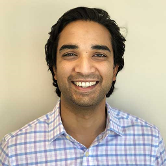
“Everything is moving at the speed of sound and possibly even the speed of light,” Nimit Patel co-managing partner of NextProtocol Capital, said during a session on blockchain and digital currency.
“UT Dallas launched the EmTech Summit to give faculty, students and professionals a deeper understanding of how and why tech is changing so quickly,“ said Steve Guengerich, executive director of the Institute for Innovation and Entrepreneurship, whose academic programs are based in the Naveen Jindal School of Management.
“A key component of the institute’s mission is ‘innovation’ leadership, helping UT Dallas stay at the forefront of all these important new topics. Working with faculty and business leaders, we view the summit as a platform for inspiring new research and convening pioneering people and companies to collaborate,” Guengerich said.
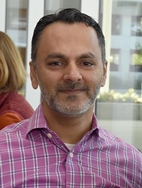
Tahir Hussain, a Dallas tech startup investor and CEO of Collide Village, a business accelerator, said he was surprised by how many new ideas he was learning about during the summit.
“I’ve met with at least six different people with really innovative projects that I wasn’t aware of before today,” said Hussain, a 1994 BS in electrical engineering alumnus of the Erik Jonsson School of Engineering and Computer Science who serves on the institute’s Entrepreneurship Council. “This summit is a really big accomplishment. It’s a great way to bring the community together and connect companies with the University.”
More than 20 tech innovators from around the globe spoke about dozens of topics during the summit. At some sessions, the air was buzzing with technical terms like “hash rate,” “forking” and “shards.” But you do not have to be an insider to grasp how quickly new tech is impacting society today, said Brenden Duderstadt, a sophomore in JSOM’s BS in Information Technology and Systems program.
“This conference is all about the potential for the general public to get support and get open access for whatever they need. … New fields are opening everywhere and disrupting things in a positive way,” said Duderstadt, a member of the UT Dallas blockchain club.
Improved medical care was a topic of several discussions. In a session on how AI and machine learning affect retail, Scott Mackey of Smarter Sorting said his techno-based environmental compliance company uses blockchain to make sure unused opioid pills are destroyed to prevent drug abuse.
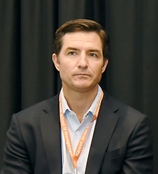
Speaking at the “Emerging Technology for a Better World” session, Nano Vision co-founder Brian Magierski explained how cryptocurrency “cure coins” can foster investment and research for everything from Alzheimer’s disease to cancer to “super bug” bacteria that can be detected by placing micro-sensors in hospital rooms.
“We no longer have to rely just on Big Pharma, big foundations or bureaucratic government agencies for funding and cures,” he said. “By tokenizing research, anyone can help build a global community to solve human health problems.”
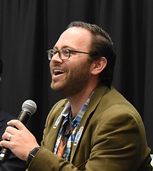
At the same session, RoboKind co-founder Richard Margolin unveiled Milo, a two-foot-tall socially interactive robot that is being used in Dallas-Fort Worth schools and around the country to improve education for children with autism. “We have to do this now. If we wait, we’re going to miss this current generation of kids,” Margolin said.
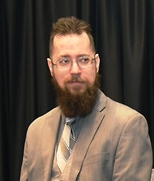

Many of the sessions involved deep discussions of “dapps” (decentralized applications) and cryptocurrencies like bitcoin. Blockchain evangelist and IBM futurist Mark Hopkins, co-founder of The Roger Wilco Agency, a branding and marketing company, said cryptocurrencies will help poorer countries develop faster by “banking the unbanked” and putting more power into the hands of individuals.
“I’m whole hog into crypto,” Hopkins said. “I even pay my son his allowance in cryptocurrency.”
But will the masses start using cryptocurrency soon — or many years from now?
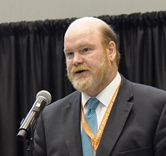
“That’s really the $64 billion question,” said Arnold Spencer, general counsel of Coinsource, a bitcoin ATM company. “Give it a few decades and the potential is enormous. … We have no idea yet how powerful this is going to be.”
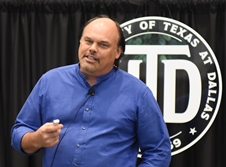
Dave Copps, a tech entrepreneur and founder of Brainspace, a machine-learning software company, was one of several speakers who talked about the rapid development of AI, which he described as “the science of teaching machines to think like a new species … not to think like humans.”
During his keynote speech, Copps envisioned a not-so-distant future in which trillions of sensors drive the global economy, robots take care of the elderly, and DNA editing creates a new breed of athletes who compete in a “genetically modified Olympics.”
New jobs will pop up to replace old ones that vanish because of AI, Copps said, but humans will still need to step up their game to keep up with the pace.
“We used to double technology every 10 years, but the changes we’ll see in the next 10 years will equal 100 years,” he said.
But for all the talk of breakneck advancements, a recurring theme at the EmTech Summit was the idea that enduring change that improves the quality of life remains the goal of all of this innovation.
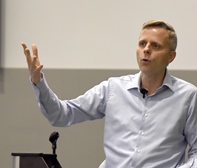
Keynote speaker Leemon Baird, founder of hashgraph, a distributed-ledger-technology alternative to blockchain, and co-founder and chief technology officer of Swirlds, a related software platform, has said it does not matter how fast a piece of technology is. What matters most is what the speed enables you to accomplish.
“We want to make moves that are revolutionary,” Baird said. “Whether it’s seven transactions per second or thousands of transactions per second, we want to change society.”
Technology Expert Kicks Off EmTech Summit With Discussion About Blockchain
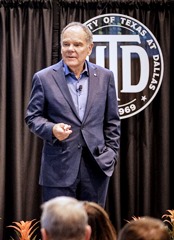
Don Tapscott, the executive director of the Blockchain Research Institute and author of 15 books related to the impact of technology on business and society, kicked off the inaugural Emerging Technologies Summit by giving the April 18 keynote address. He provided an audience of more than 500 a primer on blockchain technology. He delved into the details of how this framework will necessarily transform the business landscape in the near future because it offers a way to securely keep up with the huge amounts of data involved with rapidly evolving technological changes.
“We’re entering into a second era of the internet,” he said, explaining that he envisions a democratization of data in which virtually everyone will gain access to tools that are currently accessible only to those who can afford the steep costs.
“Why should a Filipino nanny in Toronto pay 14 percent to send money to her mom in the Philippines?” he asked, explaining that the high cost of financial transactions excludes a couple of billion people from the global economy.t
Tapscott summarized the usefulness of blockchain by explaining that, for the first time in history, people can make peer-to-peer transactions that involve something of value and have confidence that they can trust that the transaction will be successful — and without a middleman.
“Trust is not achieved by a big intermediary, necessarily,” he said. “It’s achieved by cryptography, by collaboration and by some clever code.”
Blockchain works, Tapscott said, because millions of data miners around the world simultaneously validate every transaction and then bundle it into secure blocks of data that can no longer be altered, thus ensuring that the sender does not commit fraud by somehow retaining the item of value that was handed off to the recipient. Anyone who tries to hack a block to commit fraud would have to hack not only that block, but every previous block in the history of the chain and every copy of that block on millions of computers, all of which use the highest level of cryptography.
“I won’t say that it’s unhackable, but it’s going to be tough,” he said. “It’s a lot more secure than the computing systems that you have today in your companies.”






